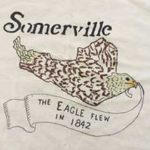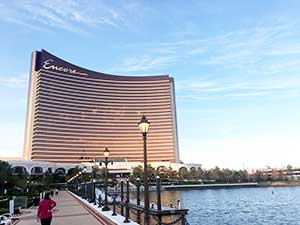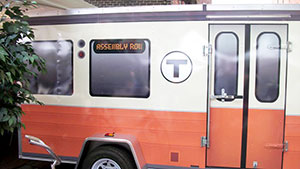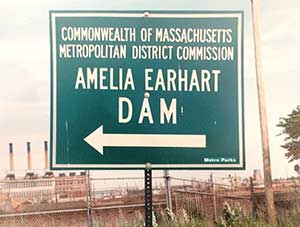 Eagle Feathers #256 – Everett
Eagle Feathers #256 – Everett
By Bob (Monty) Doherty
The roots of Everett, Massachusetts run deep. Its settlement goes back to 1640 when it was known as Charlestown’s Mystic Side and later as Malden. She separated from Malden in 1870 and in 1892 went through the transformation from a town to a city. On May 27, 1776, as part of Malden, she was the first town to petition the Colonial Government to withdraw allegiance from King George.
On August 6, 1775, British troops and two naval floating batteries attacked, torched, and bombed the Penny Ferry and its buildings. The Ferry transported passengers and goods across the Mystic River from today’s Sullivan Square or Charlestown Neck to today’s Encore Boston Harbor Casino in Everett. American cannon fire from Temples Point at Somerville’s Ten Hills drove the enemy out.

Today, the thirty-three-acre casino, resort, and entertainment complex and the Orange Line at Somerville’s Assembly Square will soon join the two cities by a pedestrian and bicycle bridge across the Mystic River.

Down through the years, Everett citizens have demonstrated their loyalty in times of emergency and peace by their patriotic service in the armed forces of our nation and elsewhere.
Who was their city named after? Edward Everett began his political rise in 1825 where he enjoyed a panoramic view of beautiful South Malden. At that time, he was living in his mansion home on the summit of Winter Hill where he witnessed and loved the charming landscape of meadowlands and the farm area that hugged the Mystic River’s shore.

This area was near today’s Amelia Earhart Dam that is shared by Somerville and Everett. His Winter Hill home was on the path of Paul Revere’s ride, and his fiftieth anniversary speech at Lexington brought the famous ride to light. He never could have imagined the thousands of houses that are there today, the future Assembly Square, or the $2.4 billion casino and convention design project across the Mystic.
During his lifetime, Everett became one of America’s most famous public speakers. As an orator, he was the keynote speaker at Gettysburg, being eclipsed by President Lincoln’s address. Everett stated to Lincoln, “I should be glad if I could flatter myself that I came as near to the central idea of the occasion, in two hours, as you did in two minutes.” It is said that Lincoln was humbled by Everett’s praise.

He also canvassed the country giving dozens of free speeches to save President George Washington’s home, Mt. Vernon. He died in 1865, the last year of the Civil War. Just scratching the surface of his incredible career, one would mention that he was a brilliant clergyman, a Massachusetts Congressman, Senator, and Governor. He was Ambassador to England, President of Harvard College, United States Secretary of State and Vice-Presidential Candidate. In 1870, the proud residents of South Malden separated from Malden to become Everett. Its citizenry couldn’t have elected a more deserving statesman to honor their new town.
Everett would certainly be proud looking down from today’s Winter Hill!















Reader Comments